Exclusive: UCI ProTeam ranking system revealed
How the points system works and is it fair?
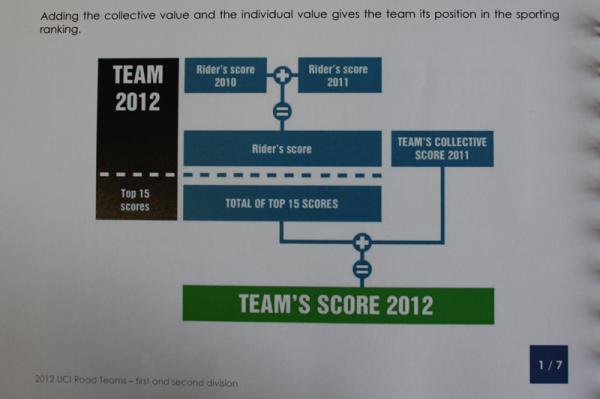
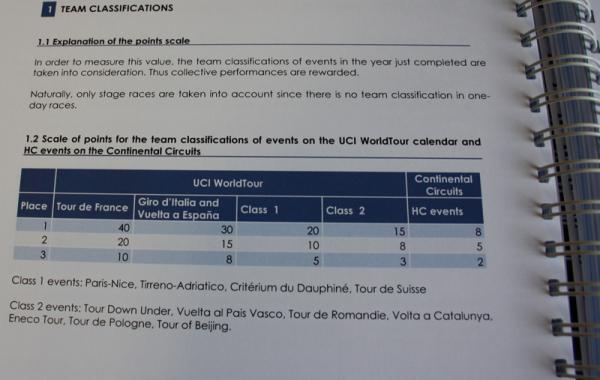
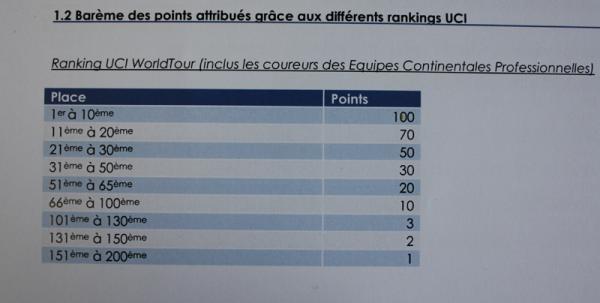
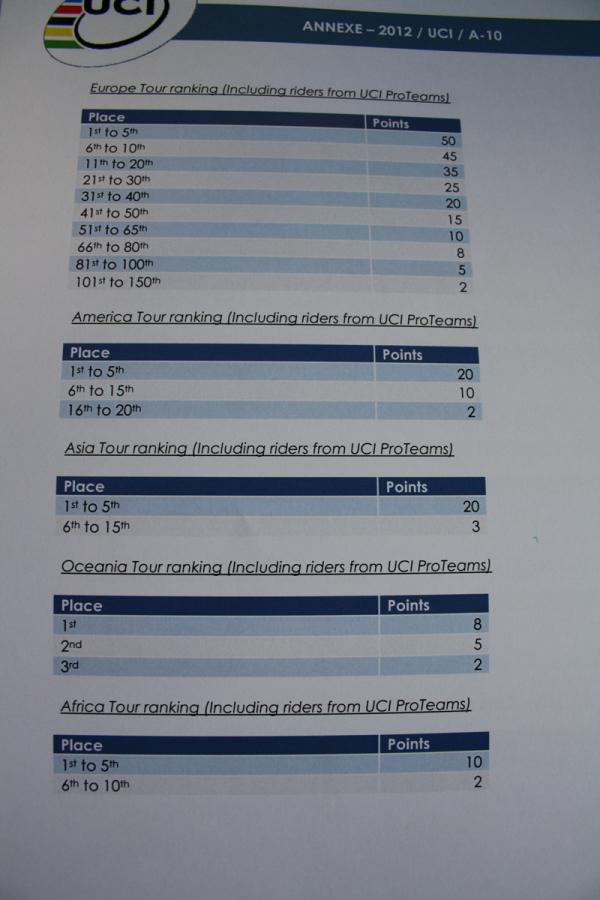
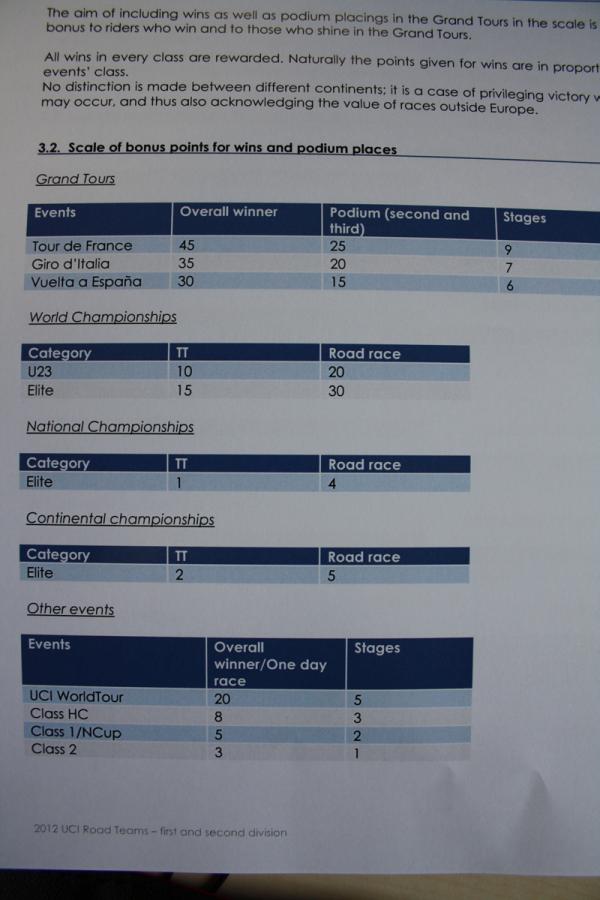
The UCI has developed a new sporting criterion on which teams will be assessed for the awarding of UCI ProTeam licences for 2012
The UCI has always refused to reveal the complex tables and points scales used to award the licences, claiming riders would use them when negotiating their contracts. However, multiple representatives from the 39 teams present at the UCI Seminar last Monday in Brussels were given details of the system as part of the instruction manual for applying for ProTeam status.
Cyclingnews news has obtained a copy of the manual.
As has been reported before, the UCI bases its assessment of ProTeam candidates on four criteria: sporting, ethical, financial and administrative. Teams have until October 20, 2011 to complete the complex application process for 2012 licences.
Sporting Criterion
The revised sporting criterion points system consists of both individual rider points scores and collective team scores. The official document states that, “the purpose of the individual value is to determine the strength of the riders making up the team for the following year.”
Each team’s points total is calculated by adding together the Individual sporting value of its top 15 riders from the previous two seasons, plus the points scored for top three placings in team classifications at races, and points for wearing and winning leader’s jerseys.
The latest race content, interviews, features, reviews and expert buying guides, direct to your inbox!
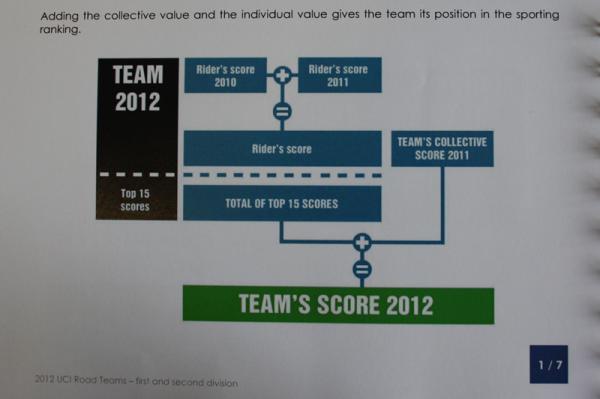
Individual rider’s sporting value
Each rider's value is calculated on the basis of his placings in a combined ProTeam and Professional Continental ranking based on the WorldTour and Continental official ranking from the two previous seasons.
There are also extra points scored for race victories, podiums in grand tours, world and national championships. For example, riders finishing in the top 10 of the combined individual UCI ranking each score 100 points. Other points are awarded on a sliding scale to riders in the top 200 of the individual ranking. Riders in the top five placings of the Europe Tour score 50 points. The extra points appear to be heavily weighted towards the UCI’s WorldTour races.
Victory in the Tour de France is worth 45 extra points, at the Giro d’Italia 35 extra points and the Vuelta a Espana 30 extra points. The world road race title is worth 15 extra points. A stage in a race like the Tour of Beijing would award a rider five extra points with 20 for overall victory. In comparison a stage in the Amgen Tour of California, which is only part of the Americas Continental calendar and not the WorldTour, would see a rider score just three points and eight extra points for overall victory.
This could lead ProTeams to focus more on the WorldTour at the expense of other races.
U23 rankings
Under 23 riders that turn professional with a team also score points, with the aim to reward teams that have an ‘effective and forward-looking development policy’.
For finishing in the top ten of the Under 23 Tour ranking, riders are awarded 20 points, with similar scales placed on the other Continental Tour rankings.
Collective team scores
The UCI claim that this points scale is based on ‘team spirit’ amongst other things but in reality it is a tally of points scored in team classifications at stage races during the past year (so for 2012, the 2011 team classification results will be used).
For example a team scores 40 points for winning the team classification in the Tour de France, 30 for the Giro d’Italia, 20 for a class one WorldTour stage race, 15 for a class two WorldTour stage race and eight points for a HC class Continental stage race.
The UCI divides WorldTour races into two ‘classes.’ In class one are Paris-Nice, Tirreno-Adriatico, Criterium du Dauphine and Tour de Suisse. In class two are Tour Down Under, Pais Vasco, Romandie, Catalunya, Eneco Tour, Tour of Poland and the Tour of Beijing.
Teams also score points for defending race leader’s jerseys. The final overall jersey winner's team scores 15 points, with a points jersey and a mountains jersey worth 10 points each. Each day a team hold a race leader’s jersey it scores three points, with two points scored for points and mountains jersey.
Penalties
Is it fair?
The revised points system will have a huge impact on riders and teams.
Points rather than purely performance will indicate a rider's worth, and will lead to teams scrambling for riders with points as they try to secure a ProTeam licence.
This will surely in turn impact the racing on the road, as rider chase points to earn extra money. A minor placing in a WorldTour race could become more valuable to a rider than giving their all for their team leader, especially if their contract ends that year.
It could also create an unfair market system. Rich teams can effectively price their poorer rivals out of the market. With no salary caps in place, the number one team in the world may not be the most successful in terms of wins but the merely the richest.
Therefore teams that try and develop crops of talented young riders could see their best riders leave at the end of the season after being offered huge sums for their points haul. Because of European employment law, contracts are becoming easier and easier to break.
For example, had Contador been banned before the rankings for 2011 were announced, Saxo Bank–SunGard would have having lost his points and those of the riders who moved to the Leopard Trek team. This could have put the team out of the top 20 of the sporting hierarchy and would have meant the team could not have obtained a ProTeam licence. Hardly a long-term safety net for a sponsor.
This in turn raises the issue of how stable sponsorship is under the UCI’s rules. How can teams calculate their number of points come October when the added element of ethics and drawn out doping cases are also brought into the equation?
It seems the only way for a team to secure entry into the Tour de France is to sign riders with the points to guarantee them a place in the WorldTour. With some sponsors having legal clauses in their contract that state they can pull out if they fail to ride the Tour de France, it leaves teams constantly on a knife edge and chasing points at almost any cost.
Daniel Benson was the Editor in Chief at Cyclingnews.com between 2008 and 2022. Based in the UK, he joined the Cyclingnews team in 2008 as the site's first UK-based Managing Editor. In that time, he reported on over a dozen editions of the Tour de France, several World Championships, the Tour Down Under, Spring Classics, and the London 2012 Olympic Games. With the help of the excellent editorial team, he ran the coverage on Cyclingnews and has interviewed leading figures in the sport including UCI Presidents and Tour de France winners.
